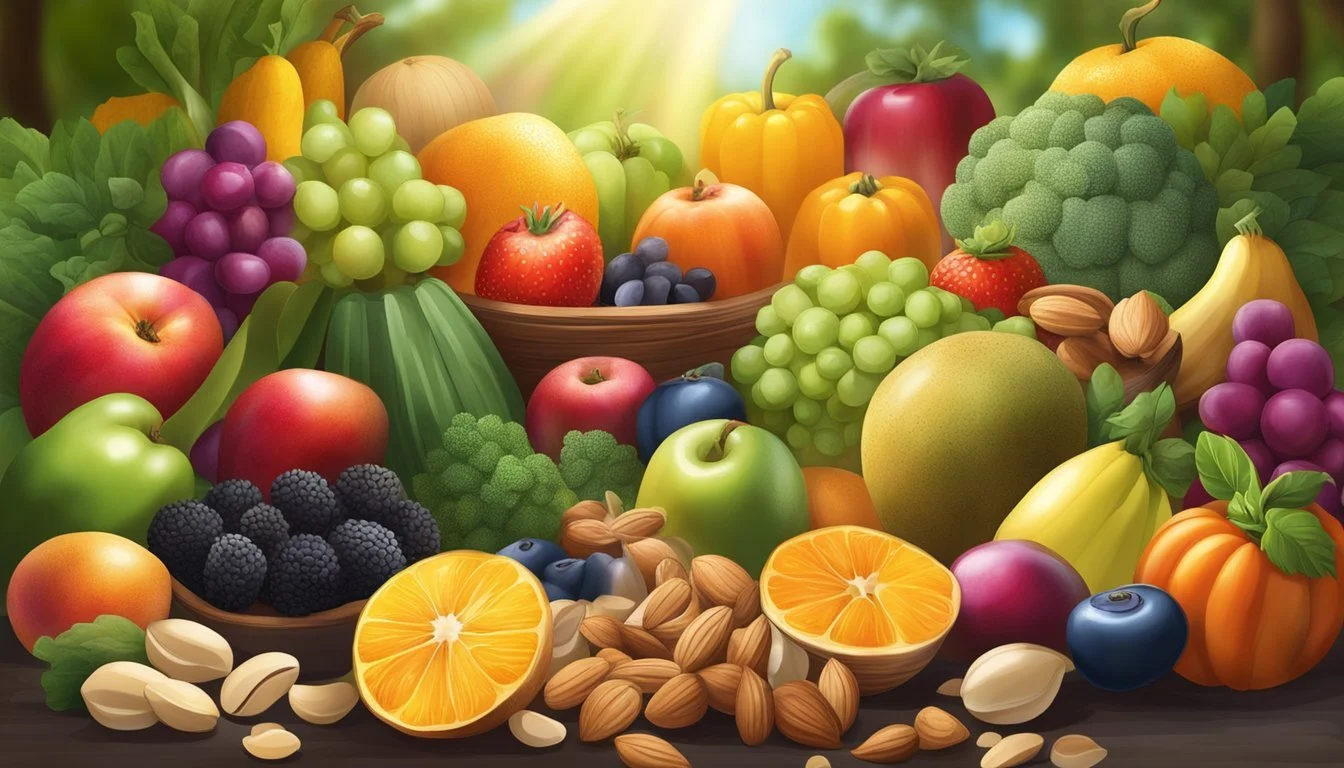Fertility-Boosting Foods That Promote Healthy Ovulation
Boosting ovulation through dietary choices is an approach that many consider both natural and effective. The relationship between nutrition and fertility is well-documented, highlighting the importance of consuming specific vitamins, minerals, and nutrients. Proper diet can play a significant role in enhancing reproductive health and increasing the likelihood of ovulation.
Nutrition impacts various aspects of the reproductive system, including hormone balance and egg quality. Foods rich in certain vitamins and minerals can provide the necessary support for these bodily functions. Adopting a well-balanced diet filled with fertility-enhancing foods can be a proactive step toward promoting ovulation and overall reproductive health.
1) Leafy Greens
Leafy greens such as spinach, kale, and Swiss chard are excellent choices for supporting ovulation. These greens are rich in essential nutrients like iron and folate, which play a crucial role in reproductive health.
Iron helps in the formation of healthy red blood cells, reducing the risk of iron-deficiency anemia, which can affect fertility. Folate aids in cell division and prevents birth defects, making it vital for those trying to conceive.
Leafy greens are also packed with antioxidants. These compounds protect the body's cells from oxidative stress, a condition that can impair ovulation. Antioxidants help fight free radicals, promoting overall cellular health.
Additionally, leafy greens provide dietary fiber. Fiber helps maintain hormonal balance by regulating blood sugar levels, which can positively impact ovulation.
Incorporating leafy greens into meals is simple and versatile. They can be eaten raw in salads, blended into smoothies, or cooked in a variety of dishes. Regular consumption of these nutrient-dense vegetables can provide a solid foundation for a healthy diet aimed at supporting ovulation.
Ensuring a diet rich in leafy greens can be a straightforward and effective way to enhance fertility and support reproductive health.
2) Citrus Fruits
Citrus fruits, such as oranges, grapefruits, and lemons, are excellent sources of vitamin C. This vitamin is crucial for hormone regulation and egg health.
These fruits also contain potassium, calcium, and folate. Folate, a B vitamin, plays a role in regulating ovulation and providing a healthy environment for eggs.
Eating at least one serving of citrus fruit each day can contribute to fertility health. Their high antioxidant content helps protect eggs from cellular damage.
Vitamin C in citrus fruits aids in iron absorption, supporting overall reproductive health. He or she aiming to boost fertility should consider incorporating these fruits into their daily diet.
3) Whole Grains
Whole grains are a crucial component of a diet designed to support ovulation. These grains include options like oats, quinoa, and whole wheat. They are rich in essential nutrients that can help enhance fertility.
Magnesium, zinc, and fiber are some of the key nutrients found in whole grains. Magnesium plays a role in regulating hormones and improving insulin sensitivity. Zinc supports healthy egg production.
Fiber in whole grains helps maintain stable blood sugar levels. This is important for preventing insulin resistance, which can negatively impact ovulation. Additionally, whole grains provide antioxidants that may preserve reproductive health.
Incorporating a variety of whole grains into daily meals can offer consistent nutritional benefits. Opting for whole grain bread, pasta, and cereals can make a significant difference.
Lastly, whole grains are versatile and can be easily integrated into many dishes. This makes them an accessible option for those looking to boost their ovulation through dietary choices.
4) Nuts and Seeds
Nuts and seeds are valuable additions to a diet aimed at supporting ovulation. They are rich in essential nutrients that play key roles in reproductive health.
Almonds, walnuts, and flaxseeds provide a good source of omega-3 fatty acids. These fats help reduce inflammation, which is crucial for a healthy reproductive system.
Zinc is another important nutrient found in many nuts and seeds. Pumpkin seeds and chia seeds are particularly high in zinc, which supports progesterone production, a hormone necessary for ovulation.
Sunflower seeds offer a significant amount of vitamin E. This vitamin acts as an antioxidant and supports healthy embryo development. Additionally, it balances sex hormones to support regular ovulation.
Nuts and seeds are also packed with magnesium. Almonds and cashews, for instance, can help regulate hormone levels and reduce stress, which can be beneficial for ovulation.
Including a variety of nuts and seeds in daily meals, either as snacks or added to dishes, can provide the necessary nutrients to support ovulation.
5) Poultry
Poultry, such as chicken and turkey, is a fantastic source of lean protein, which is crucial for hormone production and overall reproductive health. Protein helps the body develop and repair tissues and is essential for ovulation.
High in B-vitamins, especially B6 and B12, poultry aids in regulating hormone levels and reducing inflammation. This supports a healthy ovulatory cycle.
Poultry also provides essential minerals such as zinc and iron. Zinc is important for cell division, while iron ensures adequate oxygen supply to the ovaries and other reproductive organs.
For the best nutritional benefits, it is advisable to choose organic or pasture-raised poultry. These options have lower levels of antibiotics and growth hormones.
Adding a variety of poultry to the diet can provide the necessary nutrients to enhance ovulation and support fertility efforts.
6) Fish
Fish is a critical food for those looking to improve their ovulation health. Key nutrients found in fish, such as omega-3 fatty acids, play a significant role in supporting reproductive health.
Wild-caught salmon, sardines, and anchovies are excellent choices. These are rich in omega-3 fatty acids, which aid in hormone regulation and reduce inflammation, both crucial for healthy ovulation.
The FDA and EPA recommend that women trying to conceive consume 8 to 12 ounces of low-mercury fish weekly. This helps ensure adequate intake of protein and essential nutrients without exposure to harmful mercury levels.
In addition to omega-3 fats, fish also provides vitamin D, which is important for bone health and hormonal balance. Including fish in the diet can be a natural way to support ovulation and increase the chances of conception.
7) Greek Yogurt
Greek yogurt is a protein-packed dairy product that may play a crucial role in supporting ovulation.
It is rich in calcium, which is important for bone health and may improve reproductive health.
Greek yogurt also provides vitamin D and probiotics. These nutrients support overall health and may have positive effects on fertility.
For those needing additional protein, Greek yogurt is an excellent choice. Its thick texture and high protein content make it a satisfying option.
Adding Greek yogurt to a diet can be simple. It can be enjoyed on its own, mixed into smoothies, or combined with fruit and nuts for added nutrients.
Consuming Greek yogurt regularly can be a tasty and nutritious way to support ovulation health.
8) Berries
Berries are a powerhouse of nutrients that can play a significant role in enhancing ovulation. Blueberries, raspberries, and strawberries are particularly rich in antioxidants. These antioxidants protect eggs from cellular damage and aging, contributing to better fertility.
Vitamin C and folate are abundant in berries. Vitamin C supports the immune system, while folate is essential for fetal development. Additionally, these vitamins contribute to creating a healthy environment for conception.
The anti-inflammatory properties in berries also aid in improving fertility. Inflammation can affect reproductive health, and consuming berries helps to mitigate this issue. Including a variety of berries in the diet can be a tasty way to support reproductive health.
Berries are also a good source of dietary fiber. They can help maintain a healthy weight, which is crucial for hormonal balance and regular ovulation. Adding berries to daily meals can be as simple as sprinkling them on yogurt or blending them into smoothies.
9) Avocado
Avocados are rich in healthy monounsaturated fats, which are important for hormone production, including reproductive hormones. These healthy fats can help regulate the menstrual cycle and support the body's overall reproductive health.
Avocados also provide a range of vitamins and minerals that are beneficial for ovulation. They are a good source of folate, which is crucial for DNA synthesis and cell division. Adequate folate levels are associated with improved fertility and reduced risk of ovulatory infertility.
In addition to folate, avocados contain vitamin E, which has antioxidant properties. Antioxidants help protect the body’s cells from damage and support overall reproductive health. Vitamin E is also thought to play a role in improving the uterine lining, which is essential for successful ovulation and implantation.
Avocados are high in potassium, which is known to help regulate blood pressure. Proper blood circulation is essential for delivering nutrients to the reproductive organs, potentially enhancing fertility.
Including avocados in a balanced diet can provide these key nutrients that support ovulation and reproductive health. They can be easily added to salads, smoothies, or enjoyed as a spread on toast. Their creamy texture and mild flavor make them a versatile and nutritious addition to daily meals.
10) Quinoa
Quinoa is a nutrient-dense grain that can support ovulation health. It is rich in protein, providing essential amino acids that are crucial for hormone production. Including quinoa in a balanced diet can help maintain optimal reproductive health.
This grain is also an excellent source of fiber. Dietary fiber aids in regulating blood sugar levels, which is important for hormone balance. Steady blood sugar levels can support regular ovulation cycles.
Quinoa's high antioxidant content can protect reproductive cells from oxidative stress. Antioxidants like quercetin and kaempferol found in quinoa can help shield eggs and sperm from damage by free radicals, potentially enhancing fertility.
Additionally, quinoa is packed with important vitamins and minerals such as magnesium, zinc, and folate. These nutrients play a significant role in reproductive health. Magnesium supports hormone regulation, zinc is essential for cell division, and folate is vital for DNA synthesis.
Quinoa is also gluten-free, making it a suitable option for those with gluten intolerance. Its versatility in cooking allows it to be included in various meals, from salads to main dishes, making it easy to incorporate into a fertility-boosting diet.
The Role of Nutrition in Ovulation
Adequate nutrition plays a pivotal role in supporting healthy ovulation. It is essential to understand how diet influences hormone levels and the specific nutrients that aid in this process.
How Diet Affects Hormone Levels
Hormones such as estrogen and progesterone regulate the ovulation cycle. Diet directly influences hormone levels by affecting insulin sensitivity and inflammation. A diet high in trans fats, refined carbohydrates, and added sugars can lead to insulin resistance and hormonal imbalances.
Reducing these foods while incorporating complex carbohydrates from sources like whole grains can stabilize insulin levels. Additionally, omega-3 fatty acids from fish and certain seeds help modulate inflammation, supporting hormone balance. Avoiding highly processed foods and focusing on fresh, unprocessed options is crucial.
Essential Nutrients for Healthy Ovulation
Certain nutrients are particularly important for ovulation. Folic acid, found in leafy greens and fortified cereals, supports cell division and growth, vital for egg maturation. Iron, present in lean meats and beans, helps prevent ovulatory disorders.
Antioxidants such as vitamin E and C from fruits and nuts protect eggs from oxidative stress. Zinc, found in nuts and legumes, plays a role in hormone production and release. Including a variety of these nutrient-rich foods in the diet supports regular and healthy ovulation.
Incorporating a balanced intake of essential vitamins and minerals ensures that the reproductive system functions optimally, enhancing the chances of successful ovulation.
Effective Diet Changes for Enhancing Ovulation
Certain dietary changes can play a significant role in enhancing ovulation. Eating antioxidant-rich foods and maintaining balanced blood sugar levels are two specific strategies that can help boost fertility.
Increasing Intake of Antioxidant-Rich Foods
Antioxidants, such as vitamin E, vitamin C, and selenium, combat oxidative stress and improve egg health, which can enhance ovulation. Foods rich in these nutrients include walnuts, which are easy to consume and contain omega-3 fatty acids that improve fertility.
Leafy greens like spinach and kale offer vitamin C, while berries provide a range of antioxidants. Egg yolks provide essential vitamins like A, D, E, and K2. Incorporating these foods into the diet can support hormonal balance and improve fertility.
Balancing Blood Sugar Levels
A stable blood sugar level is vital for hormonal balance and regular ovulation. Consuming foods with a low glycemic index (GI) helps maintain steady blood sugar. Whole grains like quinoa and brown rice release sugar slowly into the bloodstream.
Fiber-rich foods, such as fruits, vegetables, and legumes, aid in regulating insulin and reducing blood sugar spikes. Avoiding refined sugars and simple carbohydrates minimizes hormonal disruptions.
Lean proteins like chicken and fish provide essential nutrients without causing blood sugar spikes. Adopting these dietary habits stabilizes insulin levels, supporting healthy ovulation.






